ENEG20003 Sustainability Studio: Plastic Waste Reflective Paper
VerifiedAdded on 2023/06/08
|10
|2010
|444
Report
AI Summary
This report addresses the critical issue of plastic waste and its impact on the environment. It begins by introducing the challenges posed by plastic waste, including its sources and environmental consequences. The report then explores various mitigation strategies, such as reducing plastic bag usage, promoting environmental education, and implementing stricter regulations on plastic disposal and recycling. It identifies key stakeholders involved in plastic waste management, including society, government, retailers, supermarkets, and customers, and discusses their roles and responsibilities. The report also examines the requirements of these stakeholders, such as increased awareness, updated technologies for waste management, and public support for government initiatives. The conclusion emphasizes the need for collective action from individuals, businesses, and governments to address the plastic waste crisis and promote a more sustainable future. Desklib provides access to this and other solved assignments for students.
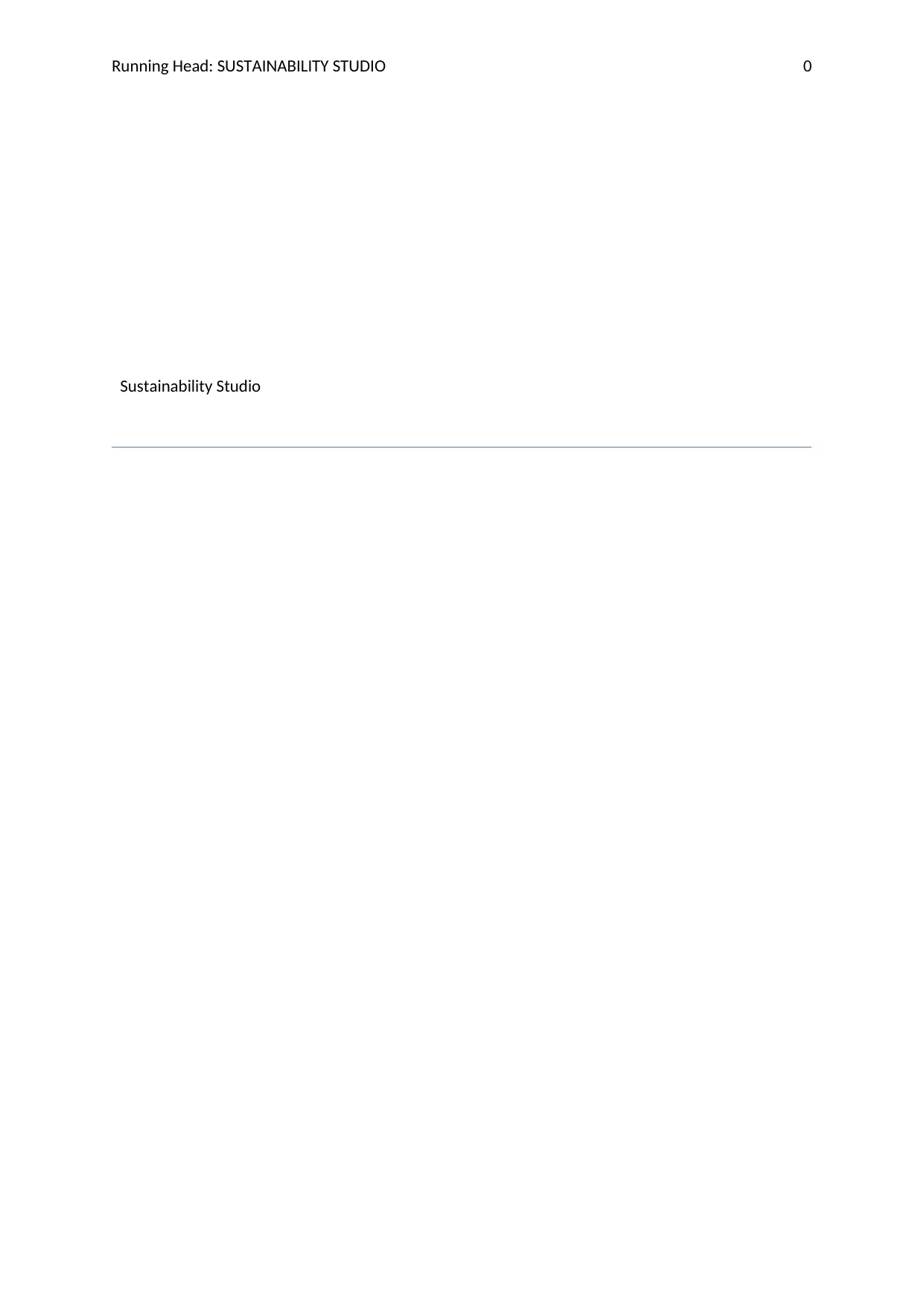
Running Head: SUSTAINABILITY STUDIO 0
Sustainability Studio
Sustainability Studio
Paraphrase This Document
Need a fresh take? Get an instant paraphrase of this document with our AI Paraphraser
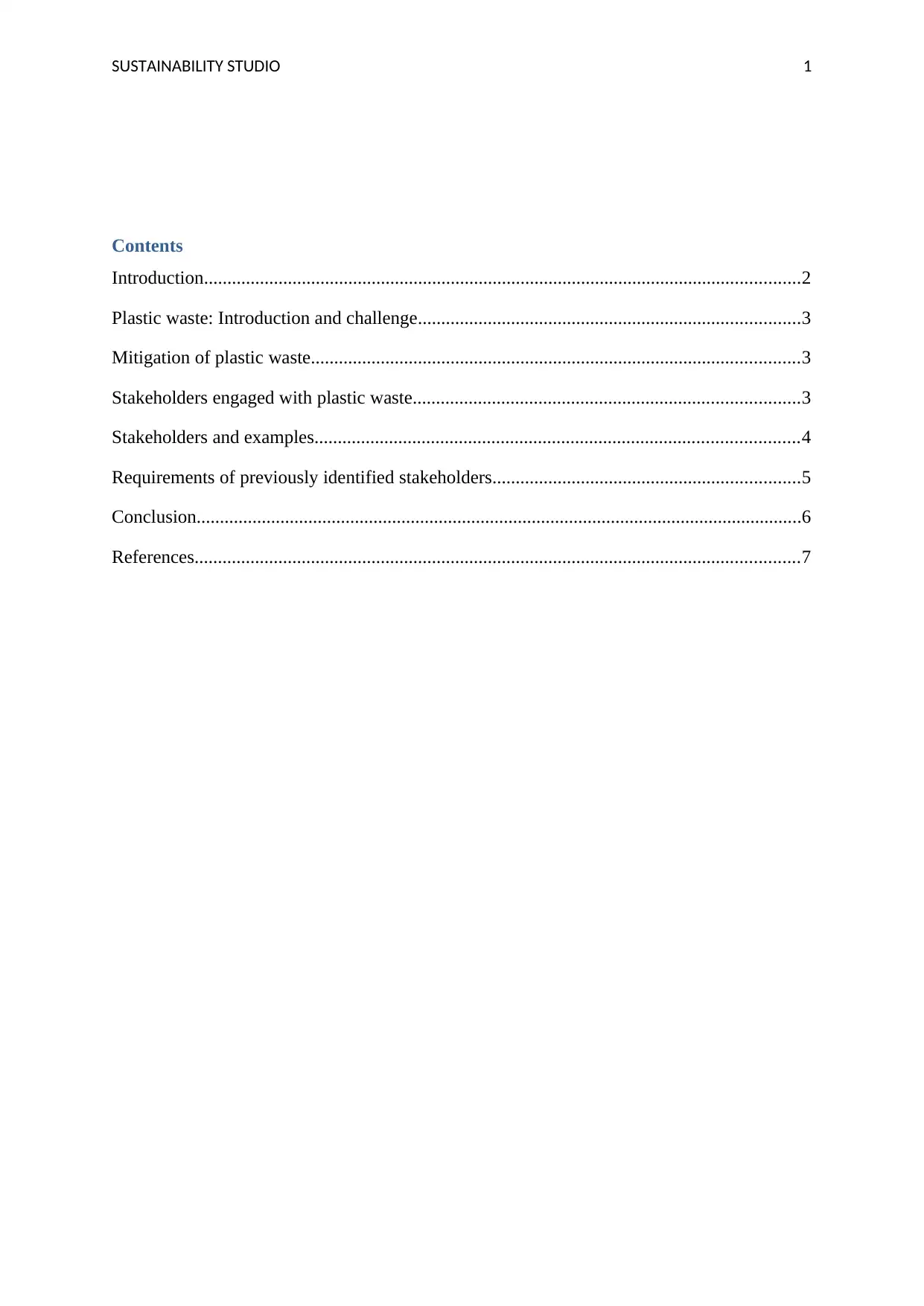
SUSTAINABILITY STUDIO 1
Contents
Introduction................................................................................................................................2
Plastic waste: Introduction and challenge..................................................................................3
Mitigation of plastic waste.........................................................................................................3
Stakeholders engaged with plastic waste...................................................................................3
Stakeholders and examples........................................................................................................4
Requirements of previously identified stakeholders..................................................................5
Conclusion..................................................................................................................................6
References..................................................................................................................................7
Contents
Introduction................................................................................................................................2
Plastic waste: Introduction and challenge..................................................................................3
Mitigation of plastic waste.........................................................................................................3
Stakeholders engaged with plastic waste...................................................................................3
Stakeholders and examples........................................................................................................4
Requirements of previously identified stakeholders..................................................................5
Conclusion..................................................................................................................................6
References..................................................................................................................................7
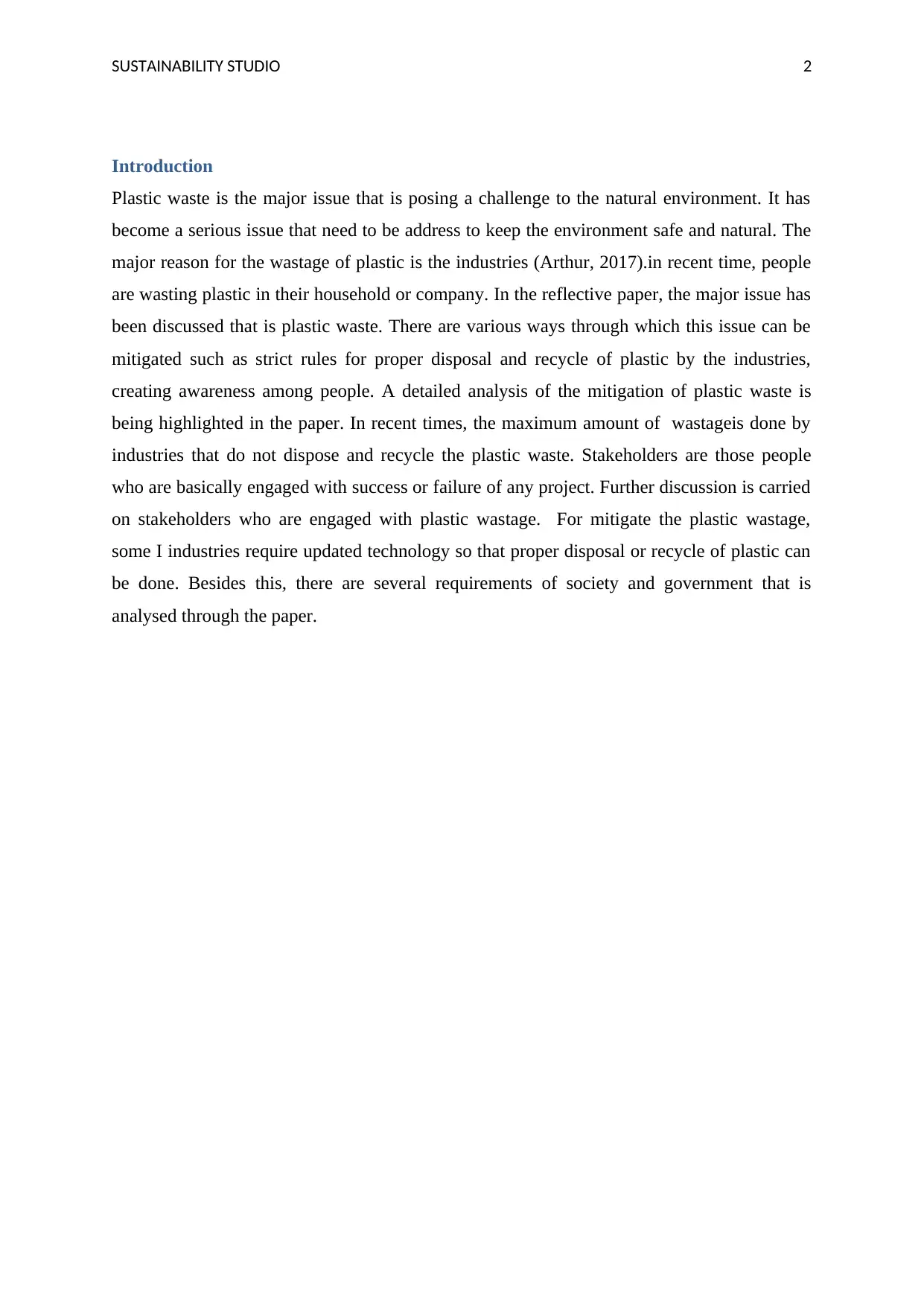
SUSTAINABILITY STUDIO 2
Introduction
Plastic waste is the major issue that is posing a challenge to the natural environment. It has
become a serious issue that need to be address to keep the environment safe and natural. The
major reason for the wastage of plastic is the industries (Arthur, 2017).in recent time, people
are wasting plastic in their household or company. In the reflective paper, the major issue has
been discussed that is plastic waste. There are various ways through which this issue can be
mitigated such as strict rules for proper disposal and recycle of plastic by the industries,
creating awareness among people. A detailed analysis of the mitigation of plastic waste is
being highlighted in the paper. In recent times, the maximum amount of wastageis done by
industries that do not dispose and recycle the plastic waste. Stakeholders are those people
who are basically engaged with success or failure of any project. Further discussion is carried
on stakeholders who are engaged with plastic wastage. For mitigate the plastic wastage,
some I industries require updated technology so that proper disposal or recycle of plastic can
be done. Besides this, there are several requirements of society and government that is
analysed through the paper.
Introduction
Plastic waste is the major issue that is posing a challenge to the natural environment. It has
become a serious issue that need to be address to keep the environment safe and natural. The
major reason for the wastage of plastic is the industries (Arthur, 2017).in recent time, people
are wasting plastic in their household or company. In the reflective paper, the major issue has
been discussed that is plastic waste. There are various ways through which this issue can be
mitigated such as strict rules for proper disposal and recycle of plastic by the industries,
creating awareness among people. A detailed analysis of the mitigation of plastic waste is
being highlighted in the paper. In recent times, the maximum amount of wastageis done by
industries that do not dispose and recycle the plastic waste. Stakeholders are those people
who are basically engaged with success or failure of any project. Further discussion is carried
on stakeholders who are engaged with plastic wastage. For mitigate the plastic wastage,
some I industries require updated technology so that proper disposal or recycle of plastic can
be done. Besides this, there are several requirements of society and government that is
analysed through the paper.
⊘ This is a preview!⊘
Do you want full access?
Subscribe today to unlock all pages.

Trusted by 1+ million students worldwide
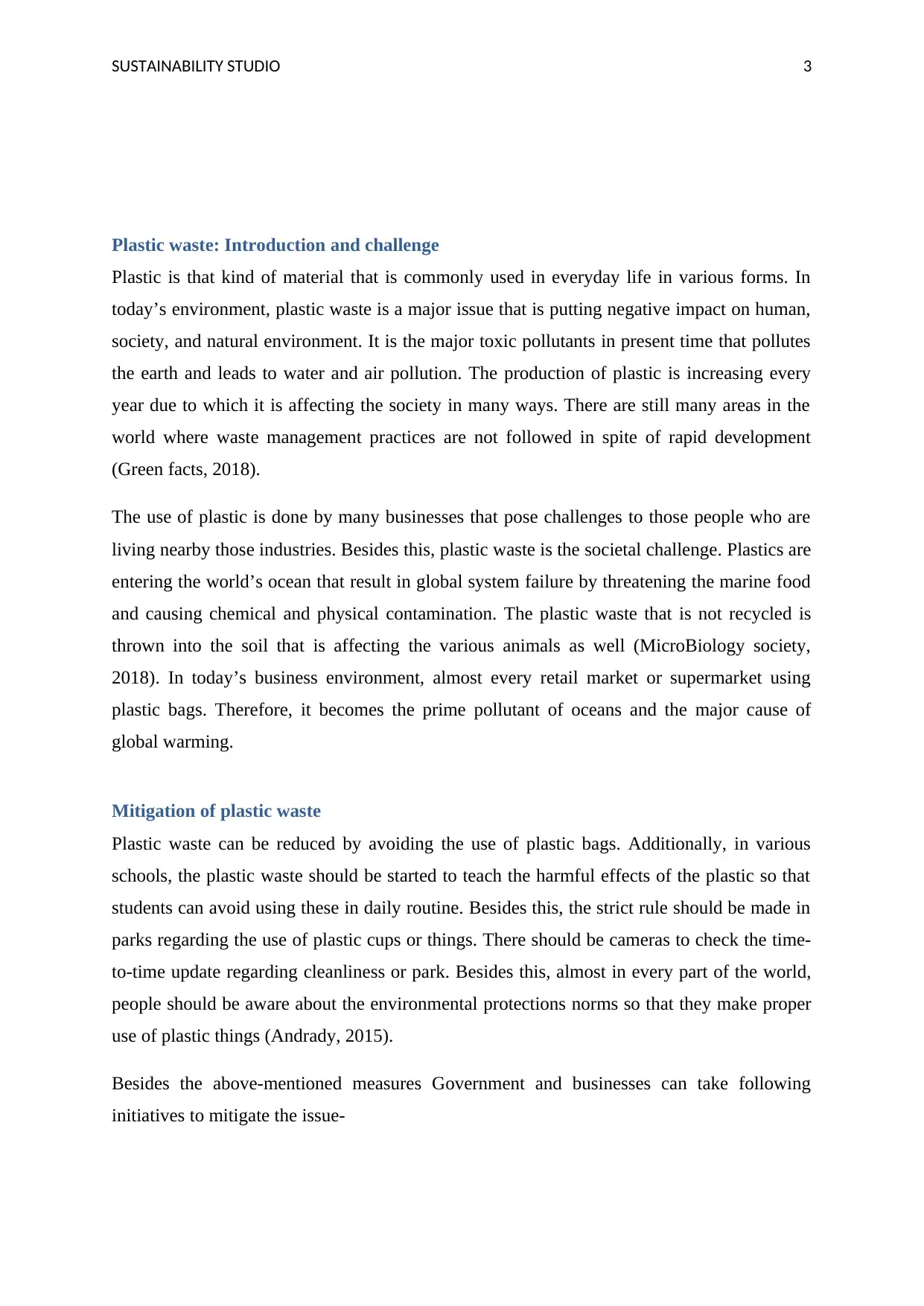
SUSTAINABILITY STUDIO 3
Plastic waste: Introduction and challenge
Plastic is that kind of material that is commonly used in everyday life in various forms. In
today’s environment, plastic waste is a major issue that is putting negative impact on human,
society, and natural environment. It is the major toxic pollutants in present time that pollutes
the earth and leads to water and air pollution. The production of plastic is increasing every
year due to which it is affecting the society in many ways. There are still many areas in the
world where waste management practices are not followed in spite of rapid development
(Green facts, 2018).
The use of plastic is done by many businesses that pose challenges to those people who are
living nearby those industries. Besides this, plastic waste is the societal challenge. Plastics are
entering the world’s ocean that result in global system failure by threatening the marine food
and causing chemical and physical contamination. The plastic waste that is not recycled is
thrown into the soil that is affecting the various animals as well (MicroBiology society,
2018). In today’s business environment, almost every retail market or supermarket using
plastic bags. Therefore, it becomes the prime pollutant of oceans and the major cause of
global warming.
Mitigation of plastic waste
Plastic waste can be reduced by avoiding the use of plastic bags. Additionally, in various
schools, the plastic waste should be started to teach the harmful effects of the plastic so that
students can avoid using these in daily routine. Besides this, the strict rule should be made in
parks regarding the use of plastic cups or things. There should be cameras to check the time-
to-time update regarding cleanliness or park. Besides this, almost in every part of the world,
people should be aware about the environmental protections norms so that they make proper
use of plastic things (Andrady, 2015).
Besides the above-mentioned measures Government and businesses can take following
initiatives to mitigate the issue-
Plastic waste: Introduction and challenge
Plastic is that kind of material that is commonly used in everyday life in various forms. In
today’s environment, plastic waste is a major issue that is putting negative impact on human,
society, and natural environment. It is the major toxic pollutants in present time that pollutes
the earth and leads to water and air pollution. The production of plastic is increasing every
year due to which it is affecting the society in many ways. There are still many areas in the
world where waste management practices are not followed in spite of rapid development
(Green facts, 2018).
The use of plastic is done by many businesses that pose challenges to those people who are
living nearby those industries. Besides this, plastic waste is the societal challenge. Plastics are
entering the world’s ocean that result in global system failure by threatening the marine food
and causing chemical and physical contamination. The plastic waste that is not recycled is
thrown into the soil that is affecting the various animals as well (MicroBiology society,
2018). In today’s business environment, almost every retail market or supermarket using
plastic bags. Therefore, it becomes the prime pollutant of oceans and the major cause of
global warming.
Mitigation of plastic waste
Plastic waste can be reduced by avoiding the use of plastic bags. Additionally, in various
schools, the plastic waste should be started to teach the harmful effects of the plastic so that
students can avoid using these in daily routine. Besides this, the strict rule should be made in
parks regarding the use of plastic cups or things. There should be cameras to check the time-
to-time update regarding cleanliness or park. Besides this, almost in every part of the world,
people should be aware about the environmental protections norms so that they make proper
use of plastic things (Andrady, 2015).
Besides the above-mentioned measures Government and businesses can take following
initiatives to mitigate the issue-
Paraphrase This Document
Need a fresh take? Get an instant paraphrase of this document with our AI Paraphraser
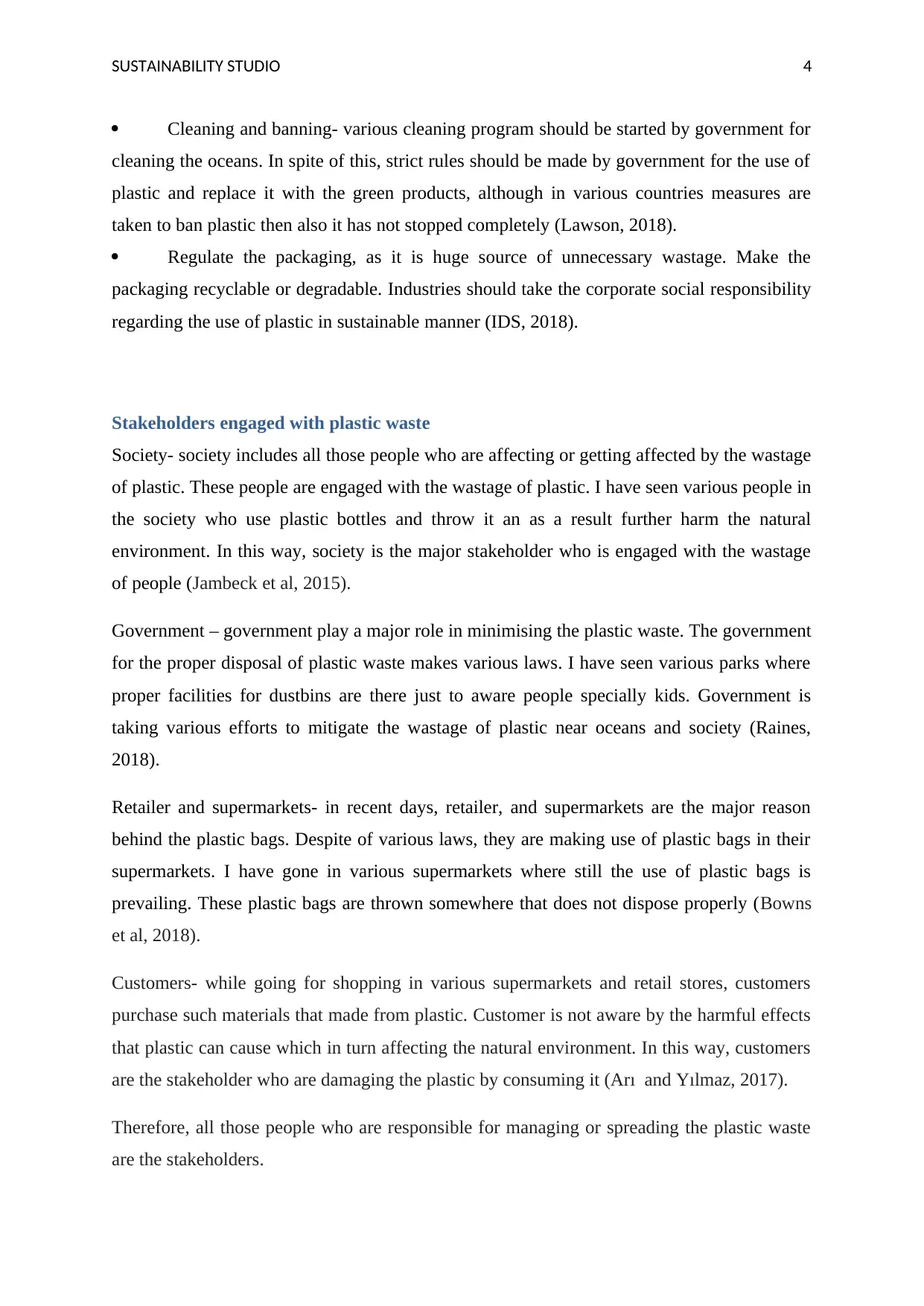
SUSTAINABILITY STUDIO 4
Cleaning and banning- various cleaning program should be started by government for
cleaning the oceans. In spite of this, strict rules should be made by government for the use of
plastic and replace it with the green products, although in various countries measures are
taken to ban plastic then also it has not stopped completely (Lawson, 2018).
Regulate the packaging, as it is huge source of unnecessary wastage. Make the
packaging recyclable or degradable. Industries should take the corporate social responsibility
regarding the use of plastic in sustainable manner (IDS, 2018).
Stakeholders engaged with plastic waste
Society- society includes all those people who are affecting or getting affected by the wastage
of plastic. These people are engaged with the wastage of plastic. I have seen various people in
the society who use plastic bottles and throw it an as a result further harm the natural
environment. In this way, society is the major stakeholder who is engaged with the wastage
of people (Jambeck et al, 2015).
Government – government play a major role in minimising the plastic waste. The government
for the proper disposal of plastic waste makes various laws. I have seen various parks where
proper facilities for dustbins are there just to aware people specially kids. Government is
taking various efforts to mitigate the wastage of plastic near oceans and society (Raines,
2018).
Retailer and supermarkets- in recent days, retailer, and supermarkets are the major reason
behind the plastic bags. Despite of various laws, they are making use of plastic bags in their
supermarkets. I have gone in various supermarkets where still the use of plastic bags is
prevailing. These plastic bags are thrown somewhere that does not dispose properly (Bowns
et al, 2018).
Customers- while going for shopping in various supermarkets and retail stores, customers
purchase such materials that made from plastic. Customer is not aware by the harmful effects
that plastic can cause which in turn affecting the natural environment. In this way, customers
are the stakeholder who are damaging the plastic by consuming it (Arı and Yılmaz, 2017).
Therefore, all those people who are responsible for managing or spreading the plastic waste
are the stakeholders.
Cleaning and banning- various cleaning program should be started by government for
cleaning the oceans. In spite of this, strict rules should be made by government for the use of
plastic and replace it with the green products, although in various countries measures are
taken to ban plastic then also it has not stopped completely (Lawson, 2018).
Regulate the packaging, as it is huge source of unnecessary wastage. Make the
packaging recyclable or degradable. Industries should take the corporate social responsibility
regarding the use of plastic in sustainable manner (IDS, 2018).
Stakeholders engaged with plastic waste
Society- society includes all those people who are affecting or getting affected by the wastage
of plastic. These people are engaged with the wastage of plastic. I have seen various people in
the society who use plastic bottles and throw it an as a result further harm the natural
environment. In this way, society is the major stakeholder who is engaged with the wastage
of people (Jambeck et al, 2015).
Government – government play a major role in minimising the plastic waste. The government
for the proper disposal of plastic waste makes various laws. I have seen various parks where
proper facilities for dustbins are there just to aware people specially kids. Government is
taking various efforts to mitigate the wastage of plastic near oceans and society (Raines,
2018).
Retailer and supermarkets- in recent days, retailer, and supermarkets are the major reason
behind the plastic bags. Despite of various laws, they are making use of plastic bags in their
supermarkets. I have gone in various supermarkets where still the use of plastic bags is
prevailing. These plastic bags are thrown somewhere that does not dispose properly (Bowns
et al, 2018).
Customers- while going for shopping in various supermarkets and retail stores, customers
purchase such materials that made from plastic. Customer is not aware by the harmful effects
that plastic can cause which in turn affecting the natural environment. In this way, customers
are the stakeholder who are damaging the plastic by consuming it (Arı and Yılmaz, 2017).
Therefore, all those people who are responsible for managing or spreading the plastic waste
are the stakeholders.
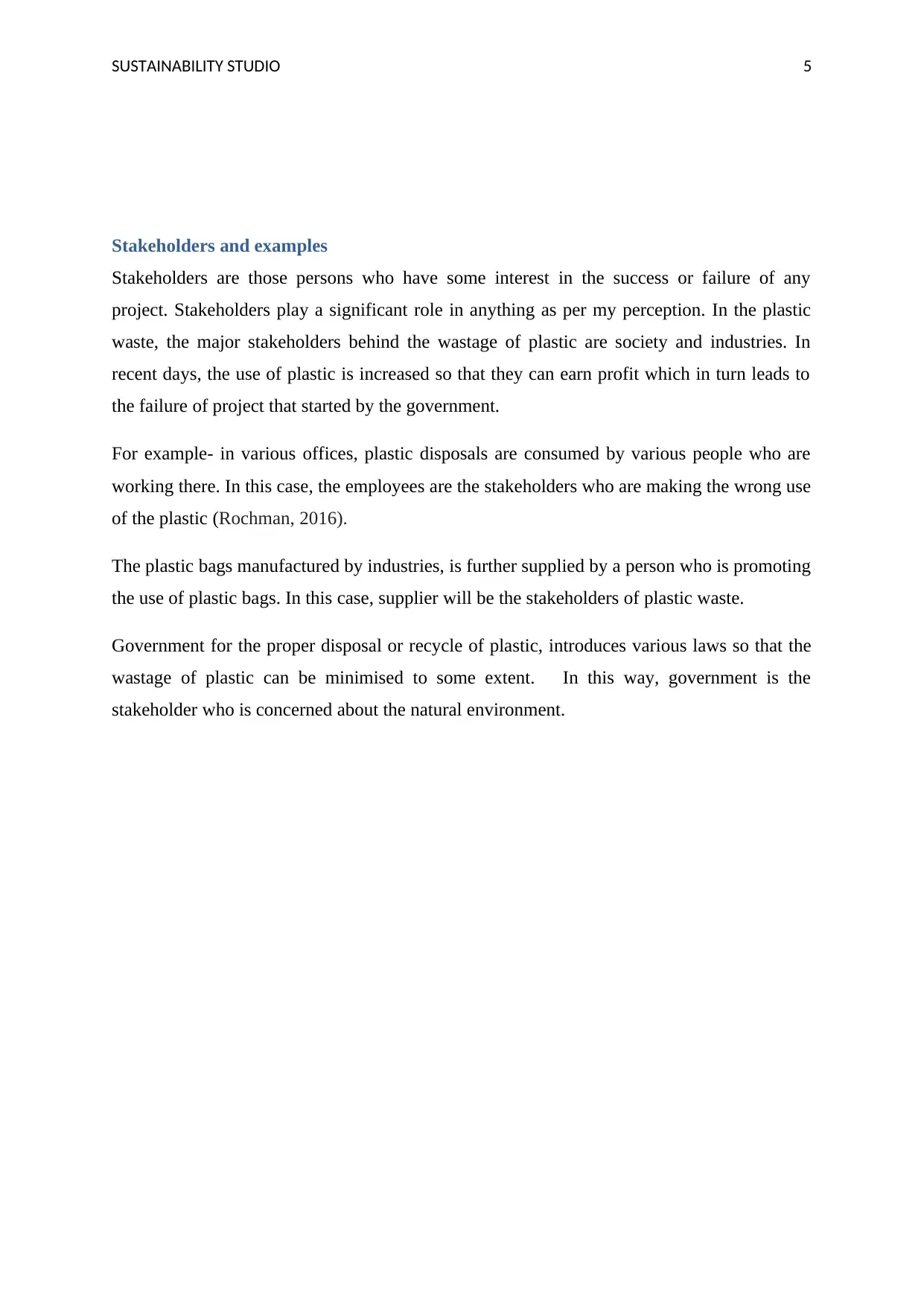
SUSTAINABILITY STUDIO 5
Stakeholders and examples
Stakeholders are those persons who have some interest in the success or failure of any
project. Stakeholders play a significant role in anything as per my perception. In the plastic
waste, the major stakeholders behind the wastage of plastic are society and industries. In
recent days, the use of plastic is increased so that they can earn profit which in turn leads to
the failure of project that started by the government.
For example- in various offices, plastic disposals are consumed by various people who are
working there. In this case, the employees are the stakeholders who are making the wrong use
of the plastic (Rochman, 2016).
The plastic bags manufactured by industries, is further supplied by a person who is promoting
the use of plastic bags. In this case, supplier will be the stakeholders of plastic waste.
Government for the proper disposal or recycle of plastic, introduces various laws so that the
wastage of plastic can be minimised to some extent. In this way, government is the
stakeholder who is concerned about the natural environment.
Stakeholders and examples
Stakeholders are those persons who have some interest in the success or failure of any
project. Stakeholders play a significant role in anything as per my perception. In the plastic
waste, the major stakeholders behind the wastage of plastic are society and industries. In
recent days, the use of plastic is increased so that they can earn profit which in turn leads to
the failure of project that started by the government.
For example- in various offices, plastic disposals are consumed by various people who are
working there. In this case, the employees are the stakeholders who are making the wrong use
of the plastic (Rochman, 2016).
The plastic bags manufactured by industries, is further supplied by a person who is promoting
the use of plastic bags. In this case, supplier will be the stakeholders of plastic waste.
Government for the proper disposal or recycle of plastic, introduces various laws so that the
wastage of plastic can be minimised to some extent. In this way, government is the
stakeholder who is concerned about the natural environment.
⊘ This is a preview!⊘
Do you want full access?
Subscribe today to unlock all pages.

Trusted by 1+ million students worldwide
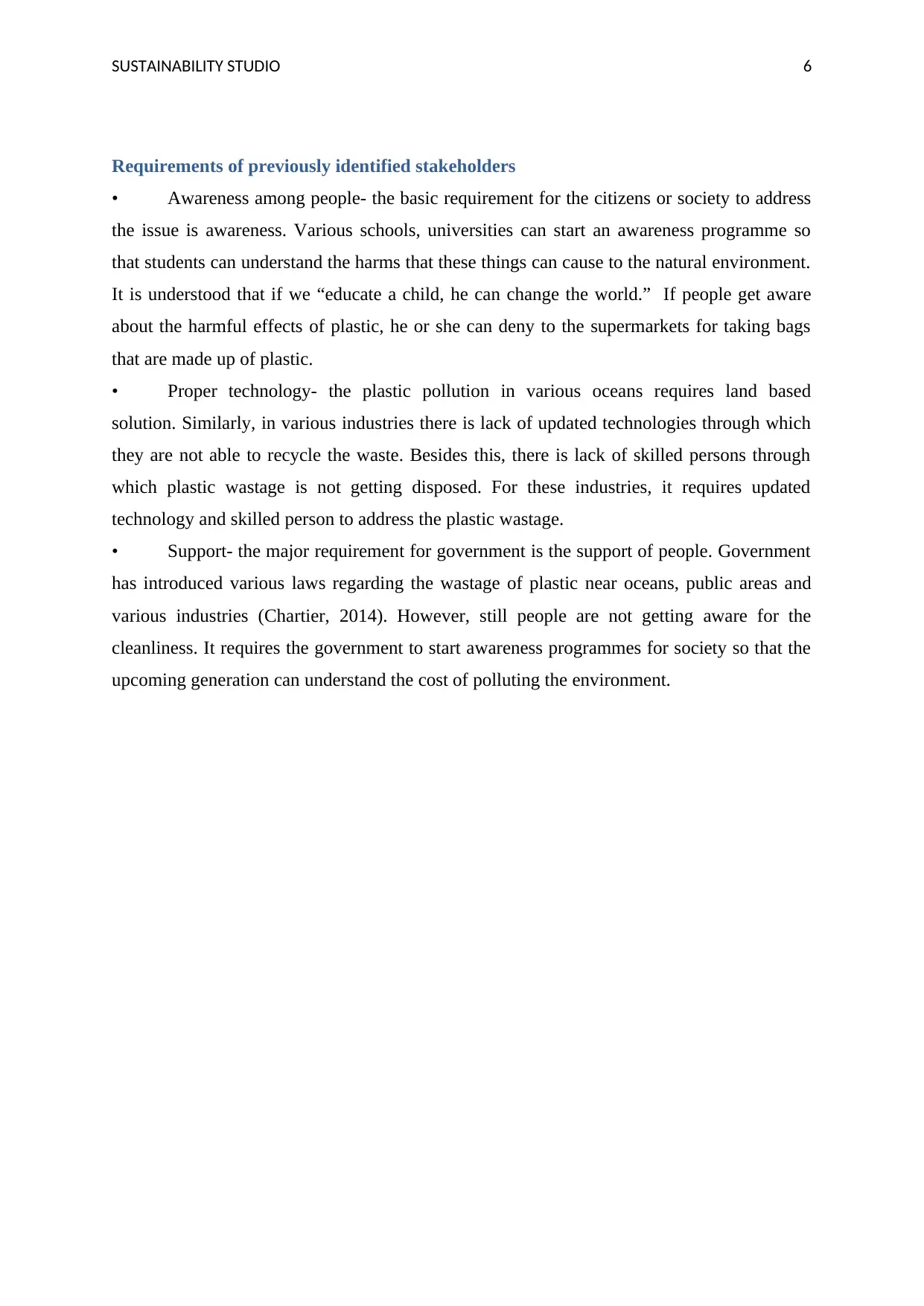
SUSTAINABILITY STUDIO 6
Requirements of previously identified stakeholders
• Awareness among people- the basic requirement for the citizens or society to address
the issue is awareness. Various schools, universities can start an awareness programme so
that students can understand the harms that these things can cause to the natural environment.
It is understood that if we “educate a child, he can change the world.” If people get aware
about the harmful effects of plastic, he or she can deny to the supermarkets for taking bags
that are made up of plastic.
• Proper technology- the plastic pollution in various oceans requires land based
solution. Similarly, in various industries there is lack of updated technologies through which
they are not able to recycle the waste. Besides this, there is lack of skilled persons through
which plastic wastage is not getting disposed. For these industries, it requires updated
technology and skilled person to address the plastic wastage.
• Support- the major requirement for government is the support of people. Government
has introduced various laws regarding the wastage of plastic near oceans, public areas and
various industries (Chartier, 2014). However, still people are not getting aware for the
cleanliness. It requires the government to start awareness programmes for society so that the
upcoming generation can understand the cost of polluting the environment.
Requirements of previously identified stakeholders
• Awareness among people- the basic requirement for the citizens or society to address
the issue is awareness. Various schools, universities can start an awareness programme so
that students can understand the harms that these things can cause to the natural environment.
It is understood that if we “educate a child, he can change the world.” If people get aware
about the harmful effects of plastic, he or she can deny to the supermarkets for taking bags
that are made up of plastic.
• Proper technology- the plastic pollution in various oceans requires land based
solution. Similarly, in various industries there is lack of updated technologies through which
they are not able to recycle the waste. Besides this, there is lack of skilled persons through
which plastic wastage is not getting disposed. For these industries, it requires updated
technology and skilled person to address the plastic wastage.
• Support- the major requirement for government is the support of people. Government
has introduced various laws regarding the wastage of plastic near oceans, public areas and
various industries (Chartier, 2014). However, still people are not getting aware for the
cleanliness. It requires the government to start awareness programmes for society so that the
upcoming generation can understand the cost of polluting the environment.
Paraphrase This Document
Need a fresh take? Get an instant paraphrase of this document with our AI Paraphraser
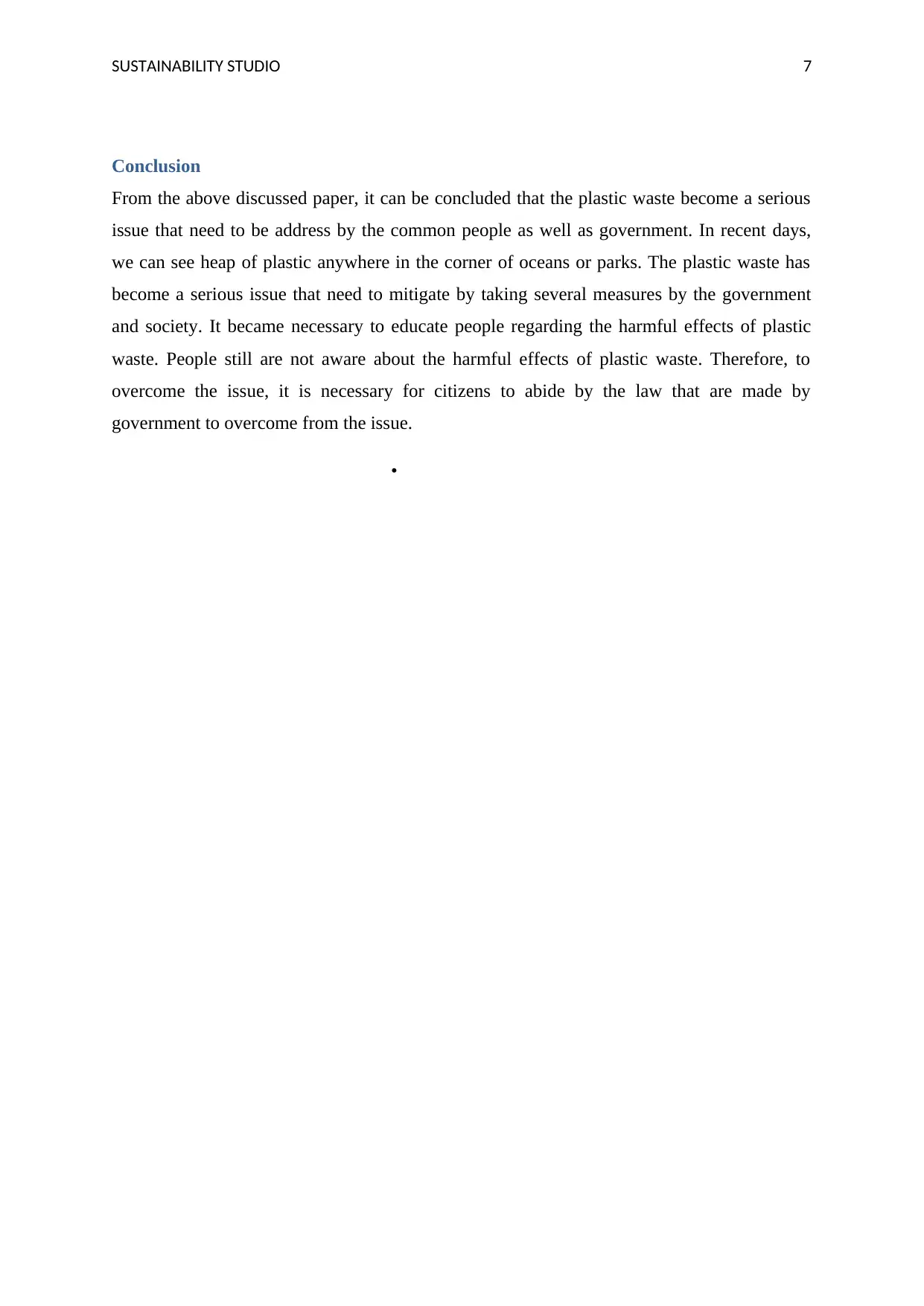
SUSTAINABILITY STUDIO 7
Conclusion
From the above discussed paper, it can be concluded that the plastic waste become a serious
issue that need to be address by the common people as well as government. In recent days,
we can see heap of plastic anywhere in the corner of oceans or parks. The plastic waste has
become a serious issue that need to mitigate by taking several measures by the government
and society. It became necessary to educate people regarding the harmful effects of plastic
waste. People still are not aware about the harmful effects of plastic waste. Therefore, to
overcome the issue, it is necessary for citizens to abide by the law that are made by
government to overcome from the issue.
•
Conclusion
From the above discussed paper, it can be concluded that the plastic waste become a serious
issue that need to be address by the common people as well as government. In recent days,
we can see heap of plastic anywhere in the corner of oceans or parks. The plastic waste has
become a serious issue that need to mitigate by taking several measures by the government
and society. It became necessary to educate people regarding the harmful effects of plastic
waste. People still are not aware about the harmful effects of plastic waste. Therefore, to
overcome the issue, it is necessary for citizens to abide by the law that are made by
government to overcome from the issue.
•
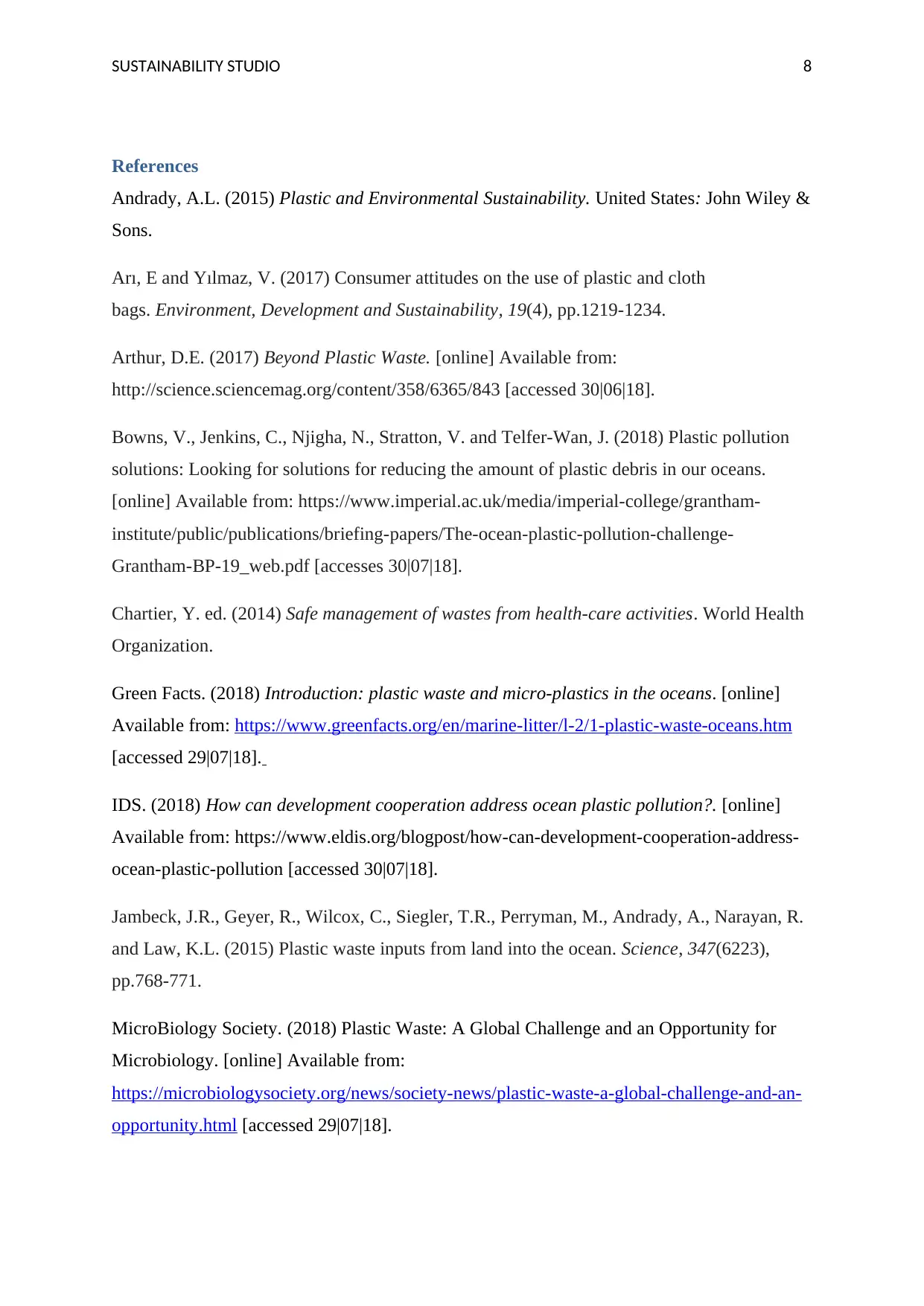
SUSTAINABILITY STUDIO 8
References
Andrady, A.L. (2015) Plastic and Environmental Sustainability. United States: John Wiley &
Sons.
Arı, E and Yılmaz, V. (2017) Consumer attitudes on the use of plastic and cloth
bags. Environment, Development and Sustainability, 19(4), pp.1219-1234.
Arthur, D.E. (2017) Beyond Plastic Waste. [online] Available from:
http://science.sciencemag.org/content/358/6365/843 [accessed 30|06|18].
Bowns, V., Jenkins, C., Njigha, N., Stratton, V. and Telfer-Wan, J. (2018) Plastic pollution
solutions: Looking for solutions for reducing the amount of plastic debris in our oceans.
[online] Available from: https://www.imperial.ac.uk/media/imperial-college/grantham-
institute/public/publications/briefing-papers/The-ocean-plastic-pollution-challenge-
Grantham-BP-19_web.pdf [accesses 30|07|18].
Chartier, Y. ed. (2014) Safe management of wastes from health-care activities. World Health
Organization.
Green Facts. (2018) Introduction: plastic waste and micro-plastics in the oceans. [online]
Available from: https://www.greenfacts.org/en/marine-litter/l-2/1-plastic-waste-oceans.htm
[accessed 29|07|18].
IDS. (2018) How can development cooperation address ocean plastic pollution?. [online]
Available from: https://www.eldis.org/blogpost/how-can-development-cooperation-address-
ocean-plastic-pollution [accessed 30|07|18].
Jambeck, J.R., Geyer, R., Wilcox, C., Siegler, T.R., Perryman, M., Andrady, A., Narayan, R.
and Law, K.L. (2015) Plastic waste inputs from land into the ocean. Science, 347(6223),
pp.768-771.
MicroBiology Society. (2018) Plastic Waste: A Global Challenge and an Opportunity for
Microbiology. [online] Available from:
https://microbiologysociety.org/news/society-news/plastic-waste-a-global-challenge-and-an-
opportunity.html [accessed 29|07|18].
References
Andrady, A.L. (2015) Plastic and Environmental Sustainability. United States: John Wiley &
Sons.
Arı, E and Yılmaz, V. (2017) Consumer attitudes on the use of plastic and cloth
bags. Environment, Development and Sustainability, 19(4), pp.1219-1234.
Arthur, D.E. (2017) Beyond Plastic Waste. [online] Available from:
http://science.sciencemag.org/content/358/6365/843 [accessed 30|06|18].
Bowns, V., Jenkins, C., Njigha, N., Stratton, V. and Telfer-Wan, J. (2018) Plastic pollution
solutions: Looking for solutions for reducing the amount of plastic debris in our oceans.
[online] Available from: https://www.imperial.ac.uk/media/imperial-college/grantham-
institute/public/publications/briefing-papers/The-ocean-plastic-pollution-challenge-
Grantham-BP-19_web.pdf [accesses 30|07|18].
Chartier, Y. ed. (2014) Safe management of wastes from health-care activities. World Health
Organization.
Green Facts. (2018) Introduction: plastic waste and micro-plastics in the oceans. [online]
Available from: https://www.greenfacts.org/en/marine-litter/l-2/1-plastic-waste-oceans.htm
[accessed 29|07|18].
IDS. (2018) How can development cooperation address ocean plastic pollution?. [online]
Available from: https://www.eldis.org/blogpost/how-can-development-cooperation-address-
ocean-plastic-pollution [accessed 30|07|18].
Jambeck, J.R., Geyer, R., Wilcox, C., Siegler, T.R., Perryman, M., Andrady, A., Narayan, R.
and Law, K.L. (2015) Plastic waste inputs from land into the ocean. Science, 347(6223),
pp.768-771.
MicroBiology Society. (2018) Plastic Waste: A Global Challenge and an Opportunity for
Microbiology. [online] Available from:
https://microbiologysociety.org/news/society-news/plastic-waste-a-global-challenge-and-an-
opportunity.html [accessed 29|07|18].
⊘ This is a preview!⊘
Do you want full access?
Subscribe today to unlock all pages.

Trusted by 1+ million students worldwide
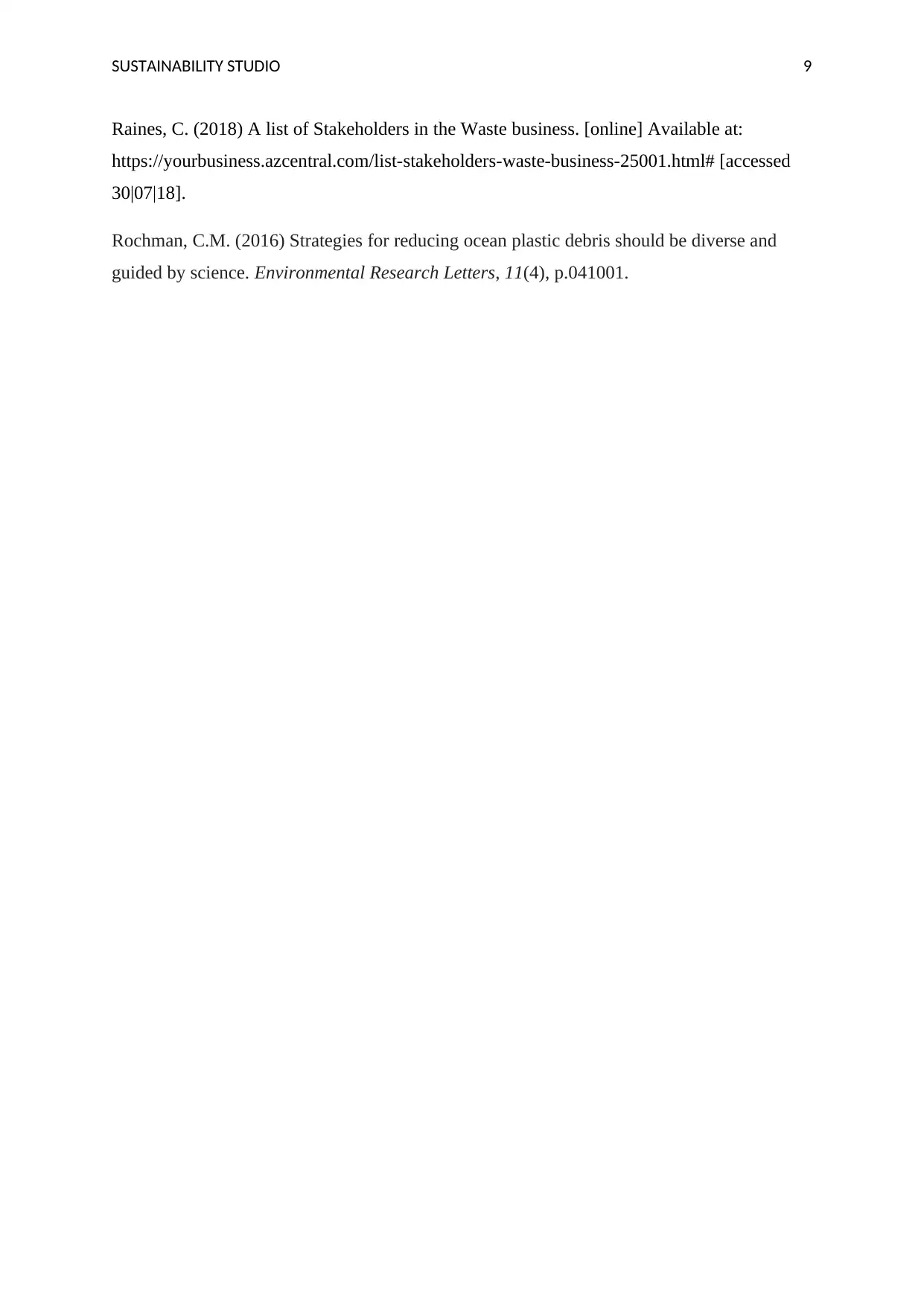
SUSTAINABILITY STUDIO 9
Raines, C. (2018) A list of Stakeholders in the Waste business. [online] Available at:
https://yourbusiness.azcentral.com/list-stakeholders-waste-business-25001.html# [accessed
30|07|18].
Rochman, C.M. (2016) Strategies for reducing ocean plastic debris should be diverse and
guided by science. Environmental Research Letters, 11(4), p.041001.
Raines, C. (2018) A list of Stakeholders in the Waste business. [online] Available at:
https://yourbusiness.azcentral.com/list-stakeholders-waste-business-25001.html# [accessed
30|07|18].
Rochman, C.M. (2016) Strategies for reducing ocean plastic debris should be diverse and
guided by science. Environmental Research Letters, 11(4), p.041001.
1 out of 10
Related Documents
Your All-in-One AI-Powered Toolkit for Academic Success.
+13062052269
info@desklib.com
Available 24*7 on WhatsApp / Email
![[object Object]](/_next/static/media/star-bottom.7253800d.svg)
Unlock your academic potential
Copyright © 2020–2026 A2Z Services. All Rights Reserved. Developed and managed by ZUCOL.





